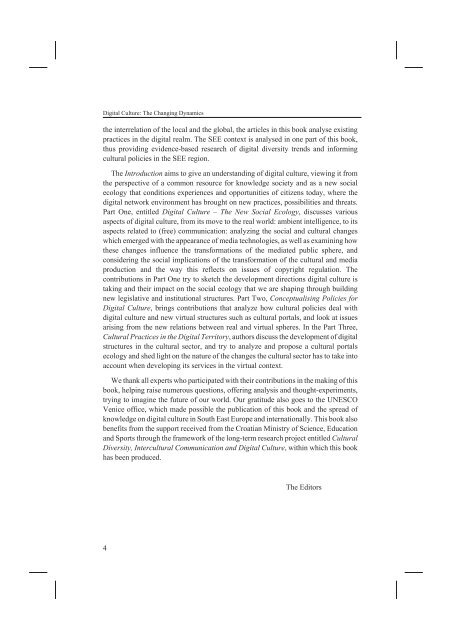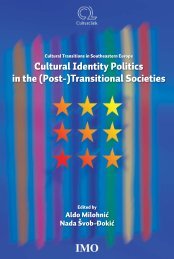D:\Documents and Settings\Ana\My Documents\Biserka-knjiga ...
D:\Documents and Settings\Ana\My Documents\Biserka-knjiga ...
D:\Documents and Settings\Ana\My Documents\Biserka-knjiga ...
You also want an ePaper? Increase the reach of your titles
YUMPU automatically turns print PDFs into web optimized ePapers that Google loves.
Digital Culture: The Changing Dynamics<br />
the interrelation of the local <strong>and</strong> the global, the articles in this book analyse existing<br />
practices in the digital realm. The SEE context is analysed in one part of this book,<br />
thus providing evidence-based research of digital diversity trends <strong>and</strong> informing<br />
cultural policies in the SEE region.<br />
The Introduction aims to give an underst<strong>and</strong>ing of digital culture, viewing it from<br />
the perspective of a common resource for knowledge society <strong>and</strong> as a new social<br />
ecology that conditions experiences <strong>and</strong> opportunities of citizens today, where the<br />
digital network environment has brought on new practices, possibilities <strong>and</strong> threats.<br />
Part One, entitled Digital Culture – The New Social Ecology, discusses various<br />
aspects of digital culture, from its move to the real world: ambient intelligence, to its<br />
aspects related to (free) communication: analyzing the social <strong>and</strong> cultural changes<br />
which emerged with the appearance of media technologies, as well as examining how<br />
these changes influence the transformations of the mediated public sphere, <strong>and</strong><br />
considering the social implications of the transformation of the cultural <strong>and</strong> media<br />
production <strong>and</strong> the way this reflects on issues of copyright regulation. The<br />
contributions in Part One try to sketch the development directions digital culture is<br />
taking <strong>and</strong> their impact on the social ecology that we are shaping through building<br />
new legislative <strong>and</strong> institutional structures. Part Two, Conceptualising Policies for<br />
Digital Culture, brings contributions that analyze how cultural policies deal with<br />
digital culture <strong>and</strong> new virtual structures such as cultural portals, <strong>and</strong> look at issues<br />
arising from the new relations between real <strong>and</strong> virtual spheres. In the Part Three,<br />
Cultural Practices in the Digital Territory, authors discuss the development of digital<br />
structures in the cultural sector, <strong>and</strong> try to analyze <strong>and</strong> propose a cultural portals<br />
ecology <strong>and</strong> shed light on the nature of the changes the cultural sector has to take into<br />
account when developing its services in the virtual context.<br />
We thank all experts who participated with their contributions in the making of this<br />
book, helping raise numerous questions, offering analysis <strong>and</strong> thought-experiments,<br />
trying to imagine the future of our world. Our gratitude also goes to the UNESCO<br />
Venice office, which made possible the publication of this book <strong>and</strong> the spread of<br />
knowledge on digital culture in South East Europe <strong>and</strong> internationally. This book also<br />
benefits from the support received from the Croatian Ministry of Science, Education<br />
<strong>and</strong> Sports through the framework of the long-term research project entitled Cultural<br />
Diversity, Intercultural Communication <strong>and</strong> Digital Culture, within which this book<br />
has been produced.<br />
4<br />
The Editors



